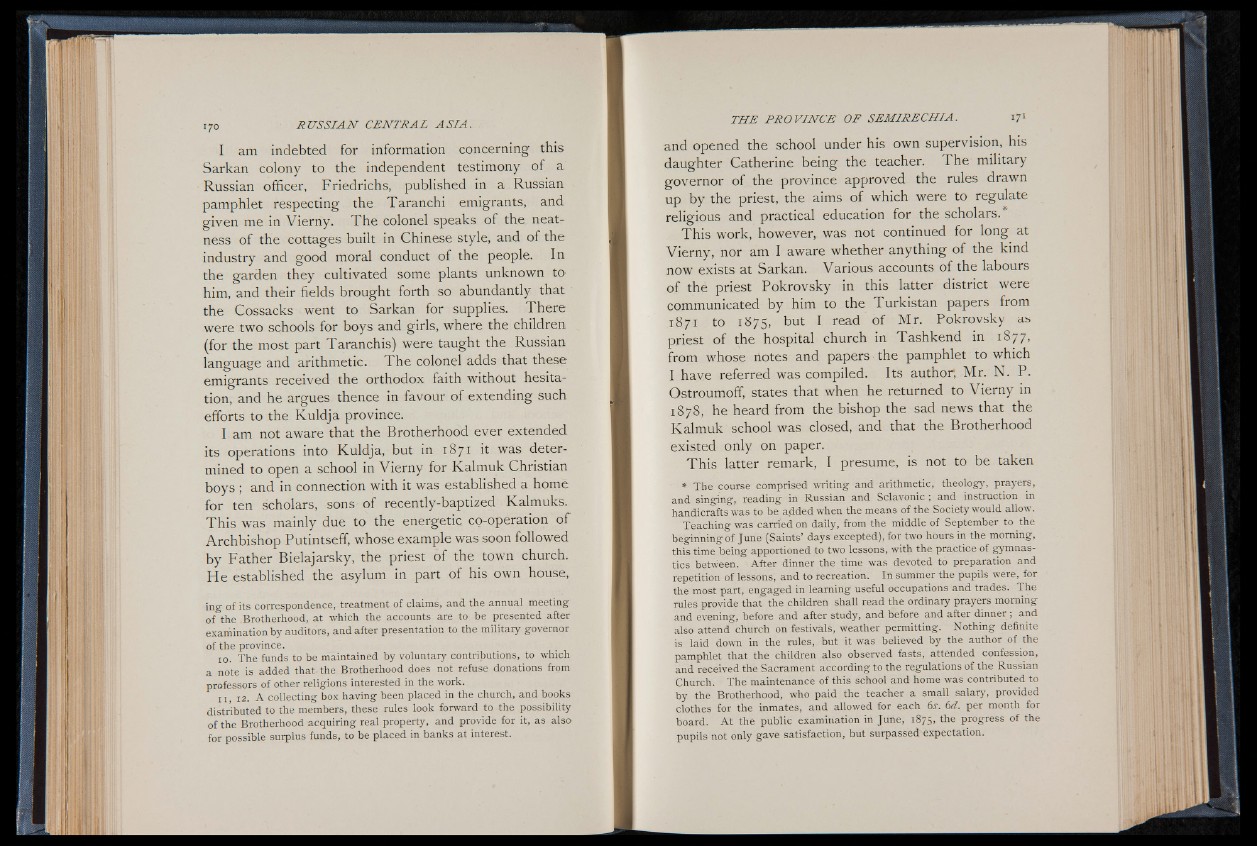
I am indebted for information concerning this
Sarkan colony to the independent testimony of a
Russian officer, Friedrichs, published in a Russian
pamphlet respecting the Taranchi emigrants, and
given me in Vierny. The colonel speaks of the neatness
of the cottages built in Chinese style, and of the
industry and good moral conduct of the people. In
the garden they cultivated some plants unknown to-
him, and their fields brought forth so abundantly that
the Cossacks went to Sarkan for supplies. There
were two schools for boys and girls, where the children
(for the most part Taranchis) were taught the Russian
language and arithmetic. The colonel adds that these
emigrants received the orthodox faith without hesitation,
and he argues thence in favour of extending such
efforts to the Kuldja province.
I am not aware that the Brotherhood ever extended
its operations into Kuldja, but in 1871 it was determined
to open a school in Vierny for Kalmuk Christian
boys ; and in connection with it was established a home
for ten scholars, sons of recently-baptized Kalmuks.
This was mainly due to the energetic co-operation o f
Archbishop Putintseff, whose example was soon followed
by Father Bielajarsky, the priest of the town church.
He established the asylum in part of his own house,
mg of its correspondence, treatment of claims, and the annual meeting
of the .Brotherhood, at which the accounts are to be presented after
examination by auditors, and after presentation to the military governor
of the province. ||g
10. The funds to be maintained by voluntary contributions, to which
a note is added that-the Brotherhood does not refuse donations from
professors of other religions interested in the work.
II 12. A collecting box having been placed in the church, and books
distributed to the members, these rules look forward to the possibility
of the Brotherhood acquiring real property, and provide for it, as also-
for possible surplus funds, to be placed in banks at interest.
and opened the school under his own supervision, his
daughter Catherine being the teacher. The military
governor of the province approved the rules drawn
up by the priest, the aims of which were to regulate
religious and practical education for the scholars.
This work, however, was not continued for long at
Vierny, nor am I aware whether anything of the kind
now exists at Sarkan. Various accounts of the labours
of the priest Pokrovsky in this latter district were
communicated by him to the Turkistan papers from
1871 to 1875, but I read of Mr. Pokrovsky as
priest of the hospital church in Tashkend in 1877,
from whose notes and papers the pamphlet to which
I have referred was compiled. Its author, Mr. N. P.
Ostroumoff, states that when he returned to Vierny in
1878, he heard from the bishop the sad news that the
Kalmuk school was closed, and that the Brotherhood
existed only on paper.
This latter remark, I presume, is not to be taken
* The course comprised writing and arithmetic, theology, prayers,
and singing, reading in Russian and Sclavonic \ and instruction in
handicrafts was to be a.dded when the means of the Society would allow.
Teaching was carried on daily, from the middle of September to the
beginningof June (Saints’ days excepted), for two hours in the morning,
this time being apportioned to two lessons, with the practice of gymnastics
between. After dinner the time was devoted to preparation and
repetition of lessons, and to recreation. In summer the pupils were, for
the most part, engaged in learning useful occupations and trades. The
rules provide that the children shall read the ordinary prayers morning
and evening, before and after study, and before and after dinner; and
also attend church on festivals, weather permitting. Nothing definite
is laid down in the rules, but it was believed by the author of the
pamphlet that the children also observed fasts, attended confession,
and received the Sacrament according to the regulations o f the Russian
Church. The maintenance of this school and home was contributed to
by the Brotherhood, who paid the teacher a small salary, provided
clothes for the inmates, and allowed for each 6s. 6d. per month for
board. A t the public examination in June, 1875, the progress of the
pupils not only gave satisfaction, but surpassed expectation.